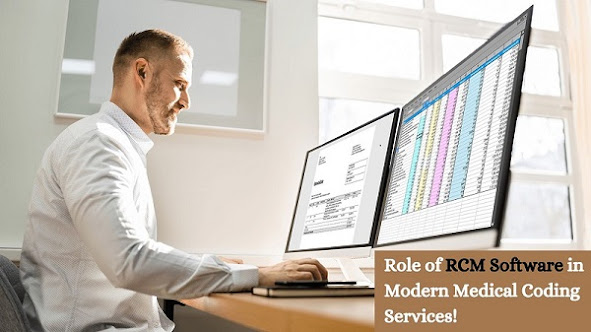The Integral Role of RCM Software in Modern Medical Coding Services
Source Link: https://theomnibuzz.com/the-integral-role-of-rcm-software-in-modern-medical-coding-services/
In the dynamic landscape of modern healthcare, the significance of precise medical coding services cannot be overstated, as it underpins rightful reimbursement, minimizes claim denials, and upholds regulatory adherence. To navigate this intricate terrain, the emergence of Revenue Cycle Management software stands as a cornerstone. A vital asset for healthcare providers and medical coding services alike, RCM software orchestrates a streamlined approach to this complex process. This discourse illuminates the central role that RCM software assumes, seamlessly optimizing medical coding services and fostering a comprehensive enhancement of the broader revenue cycle management.
Understanding Medical Coding Services
Medical coding is the process of translating complex medical procedures, diagnoses, and services into standardized codes for billing and reimbursement purposes. These codes serve as a universal language that facilitates communication between healthcare providers, insurance companies, and regulatory bodies. Accurate coding not only ensures proper reimbursement but also helps in data analysis, research, and quality improvement in healthcare.
Challenges in Medical Coding
Medical coding is intricate and prone to errors due to the sheer volume of codes, constant updates, and evolving regulations. Human coders, while skilled, are susceptible to mistakes that can lead to claim denials, delayed reimbursements, and even compliance violations. The healthcare industry’s transition to value-based care models has added another layer of complexity, demanding greater precision and compliance with coding guidelines.
Challenges in Medical Coding
Medical coding is intricate and prone to errors due to the sheer volume of codes, constant updates, and evolving regulations. Human coders, while skilled, are susceptible to mistakes that can lead to claim denials, delayed reimbursements, and even compliance violations. The healthcare industry’s transition to value-based care models has added another layer of complexity, demanding greater precision and compliance with coding guidelines.
Navigating the intricate domain of medical coding is not devoid of challenges. The vast array of codes, perpetually evolving regulations, and the potential for human error pose formidable obstacles. These challenges can lead to claim denials, delayed reimbursements, and even regulatory non-compliance. However, in this complex landscape, the emergence of Revenue Cycle Management (RCM) software has emerged as a beacon of hope.
By harnessing sophisticated algorithms, real-time updates, and workflow automation, RCM software addresses these challenges head-on. It ensures precise code assignment, reducing the margin for human error and minimizing the risk of claim denials. With its real-time updates, the software ensures that coding guidelines are always current and compliant, alleviating the burden of staying up-to-date.
The automation of routine tasks streamlines the coding process, accelerating the revenue cycle and leading to swifter reimbursements. RCM software’s ability to perform claim scrubbing and audits before submission prevents errors and enhances compliance, safeguarding providers from legal ramifications. Thus, RCM software stands as a formidable ally in the battle against coding challenges, offering a comprehensive solution that not only mitigates risks but also fosters a more efficient and accurate medical coding ecosystem.
The Role of RCM Software
RCM software is designed to address the challenges of medical coding outsourcing services by automating and optimizing various stages of the revenue cycle. Its role in medical coding can be summarized in the following key areas:
Efficiency and Accuracy: RCM software utilizes sophisticated algorithms and coding rules to ensure accurate code assignment. This significantly reduces human errors and minimizes the risk of claim denials due to coding discrepancies.
Real-time Updates: Keeping up with the ever-changing coding guidelines and regulations is a formidable task. RCM software integrates real-time updates, ensuring that codes are always current and in compliance with the latest industry standards.
Workflow Automation: RCM software streamlines the coding process by automating routine tasks such as code lookups, code assignment, and claim submission. This accelerates the overall revenue cycle, leading to faster reimbursements.
Data Analytics: RCM software collects and analyzes coding data, offering insights into coding patterns, reimbursement trends, and areas of improvement. These insights empower healthcare providers to make informed decisions for optimizing their revenue cycle.
Claim Scrubbing: RCM software includes features for claim scrubbing, which involves identifying errors or missing information before claims are submitted. This proactive approach reduces claim rejections and accelerates the payment process.
Compliance and Auditing: Adherence to coding guidelines and regulations is critical to avoid legal issues and penalties. RCM software performs regular audits to identify coding discrepancies and compliance gaps, ensuring that providers remain in accordance with industry standards.
Integration with EHRs: RCM software seamlessly integrates with Electronic Health Records (EHR) systems, enabling a more holistic view of patient information. This integration enhances coding accuracy by utilizing comprehensive patient data.
Remote Access and Collaboration: With the rise of telehealth and remote work, RCM software provides coders and billing teams the flexibility to work remotely while maintaining efficient collaboration.
Reduced Turnaround Time: The automation and optimization offered by RCM software result in faster coding and billing processes. This leads to quicker claim submissions, expedited reimbursements, and improved cash flow.
Conclusion
Within the intricate realm of medical coding services, the emergence of Revenue Cycle Management (RCM) software stands as a transformative force, reshaping the landscape of revenue cycle management for healthcare providers. With its capacity to elevate precision, streamline processes, and deftly navigate the intricate maze of coding guidelines, RCM software assumes an indispensable role within modern medical coding services.
As the healthcare sector continues to evolve, the adoption of RCM software extends beyond mere financial optimization, fostering a heightened emphasis on efficiency and compliance in medical coding practices. This not only paves the way for improved financial outcomes but also ushers in enhanced patient care and elevated operational efficiency across the healthcare spectrum.



Comments